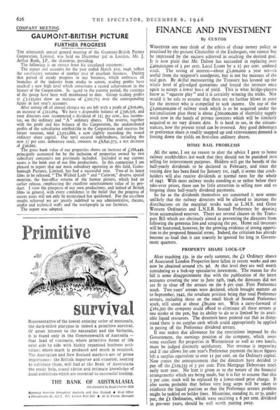FINANCE AND INVESTMENT
By CUSTOS
WHATEVER one may think of the ethics of cheap money policy as practised by the present Chancellor of the Exchequer, one cannot but be impressed by the success achieved in reaching the desired goal. It is now plain that Mr. Dalton has succeeded in replacing over L400,000,000 of 3 per cent. Local Loans by a 21 per cent, undated stock. The saving of interest—about Li,000,000 a year net—is useful from the taxpayer's standpoint, but is not the measure of the real gain. By skilful manoeuvring the Treasury has levered up the whole level of gilt-edged quotations and forced the investor once again to accept a lower basfs of yield. This is what bridge-players know as "squeeze play" and it is certainly winning the tricks. Nor would it be safe to assume that there are no further blows in store for the investor who is compelled to seek income. On top of the LI,000,000,000 of railway stock which is to be acquired under the nationalisation plan there is about Lzoo,000,000 of electricity supply stock now in the hands of private investors which will be similarly acquired at no very distant date. It is hard to see, in the circum- stances, how the present trend can be reversed. Any good debenture or preference share is readily snapped up and reinvestment demand is forcing down the yields on first-class ordinary shares.
HOME RAIL PROBLEMS
All the same, I see no reason to alter the advice I gave to home railway stockholders last week that they should not be panicked into selling for reinvestment purposes. Holders will got the benefit of the half-yearly dividends to be declared in February, and since the vesting date has been fixed for January 1st, 1948, it seems that stock- holders will also receive dividends at normal rates for the whole of 1947. With most railway stocks standing at or rather below their take-over prices, there can be little attraction in selling now and so forgoing three half-yearly dividend payments.
So far as the dividends themselves are concerned it now seems unlikely that the railway directors will be allowed to increase the distributions on the marginal stacks such as L.M.S. and Great Western Ordinaries and L.N.E.R. Second Preference by drawing from accumulated reserves. There are several clauses in the Trans- port Bill which are obviously aimed at preventing the directors from following the generous line and scraping the pot. Home rail investors will be heartened, however, by the growing evidence of strong opposi- tion to the proposed financial terms. Indeed, the criticism has already become so loud that it can scarcely be ignored for long in Govern- ment quarters.
PROPERTY SHARE LOCK-UP Alter touching 23s. in the early summer, the Li Ordinary shares of Associated London Properties have fallen in recent weeks and can now be obtained around 17s. 9d. At this level they are well worth considering as a lock-up speculative investment. The reason for the fall is some disappointment that with the publication of the latest accounts covering the year to June 24th, 1946, the directors did not see fit to clear off the arrears on the 6 per cent. First Preference stock. Two years' arrears were declared, which brought matters ap to September, 1942, the resultant position being that total Preference arrears, including those on the small block of Second Preference stock, still stand at about £80,000 net. With a carry-forward of £161,302 the company could afford to eliminate all these arrears at one stroke of the pen, but its ability to do so is limited by its avail- able liquid resources. The directors have pointed out that as things stand there is no surplus cash which could appropriately be applied in paying off the Preference dividend arrears. If one makes due allowance for the restrictions imposed by the Government, the earnings position of the company, which owns some excellent flat properties in Westminster as well as two hotels, must be judged distinctly satisfactory. Net revenue is improving and if one allows for one year's Preference payment the latest figures left a surplus equivalent to over II per cent, on the Ordinary capital. Now comes the announcement that the directors have decided :0 pay off the £229,335 of 5 per cent. First Mortgage Debenture stock early next year. No hint is given as to the nature of the financial arrangements which are being made, but it is fair to assume that this 5 per cent. stock will be replaced by a lower-rated prior charge. It also seems probable that before very long steps will be taken to reinforce the liquid position so that the Preference arrears problem might be tackled on bolder lines. Meantime, standing 2s. or 3s. under par, the Lx Ordinaries, which were receiving a 6 per cent, dividend in pre-war years, should be well worth putting away.


































 Previous page
Previous page